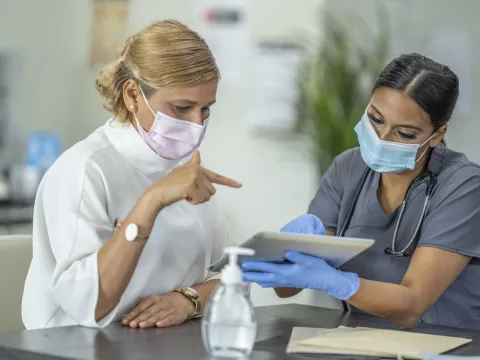- AdventHealth

Though ovarian cancer is the deadliest type to affect a woman’s reproductive system, it doesn’t have to be.
Of the women whose ovarian cancer is spotted early, 92% survive for more than five years. If the cancer isn’t found until after it spreads, the survival rate drops to 30%.
These statistics can be anxiety-inducing, but we’re sharing them to empower you. By knowing what symptoms to look for and your risk factors, you can act early.
Who Is at Risk for Ovarian Cancer?
There’s no way to predict who will get ovarian cancer, though researchers have identified the people most likely to have it. Six factors that are associated with ovarian cancer risk include:
- Age: The odds of developing ovarian cancer increase over time. Women ages 63 and older account for half of all ovarian cancer cases.
- Obesity: For women, a body mass index (BMI) of 30 or higher is considered obese. These women may have a higher risk than women with lower BMIs.
- Family history: Your risk is higher if you have a first-degree relative — a daughter, sister or mother — who has had ovarian cancer. The more relatives you have with this cancer, the higher your risk. A history of the disease in family members on your father’s side is also linked to a higher risk. A family history of breast or colorectal cancer has also been associated with an increased risk for ovarian cancer. Women who have a family history of breast cancer sometimes opt to get checked for an inherited defect in their BRCA1 and BRCA2 genes. The defect in either gene is linked to a high risk for breast cancer and ovarian cancer.
- Personal history: Women who have had colorectal, uterine or breast cancer may face a higher risk for ovarian cancer than those who have not had one of these other cancers.
- Pregnancy: Women who have their first full-term pregnancy after age 35 or never give birth have a higher risk. In fact, the more children women have, the less apt they are to get ovarian cancer. Breastfeeding may also lower your risk.
- Medications: According to some evidence, using estrogen-only hormone therapy after menopause may raise your risk.
“Having one or more of these risk factors is a good reason to talk to your doctor about ovarian cancer,” explains Dr. Roller. “But anyone, whether they fall into these categories or not, should be vigilant for symptoms.”
Know Ovarian Cancer Warning Signs
Dr. Roller reminds us that “treatment is most effective when ovarian cancer is detected early. But symptoms are often vague and may not show up until later stages of the cancer.” Easy-to-overlook warning signs may include:
- Abnormal vaginal bleeding
- Back pain
- Belly swelling with weight loss
- Diarrhea, constipation, or frequent urination
- Fatigue
- Feeling full quickly
- Pain during intercourse
- Stomach discomfort, such as pain or bloating
“If any of these symptoms are not normal for you and last for more than two weeks, talk to your doctor,” says Dr. Roller. “The bottom line in spotting any cancer of the reproductive system is knowing your body and what is and isn’t normal for you.”
Along with ovarian cancer, the other four cancers of the female reproductive system that can be deadly are cervical, uterine, vaginal and vulvar. To read more about the cancers that can affect women, check out our post.
Whole-Health Care is Close to Home
At AdventHealth Dade City, we want to be your partner in preventing, finding and treating cancer and other conditions. We’re striving for whole-person wellness, which helps you feel your best in body, mind and spirit.
Whether you’re concerned about your risk or received an ovarian cancer diagnosis, we’re here to support you. To learn more or to request an appointment, click here.



